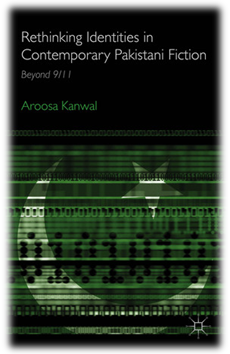Rethinking Identities in Contemporary Pakistani Fiction: Beyond 9/11
Kanwal, Aroosa
|
|
Since the inception of the ‘war on terror’ rhetoric, the definition of identity and home have transformed into something new – ‘deculturalised Islam’. Fiction based on the theme of ‘war on terror’ is going through an evolutionary phase since ages, till now. This has given rise to newly coined term ‘Islamophobia’, author wants to foreground the Anglo-American foreign policy. Now, Pakistani writers are writing back to this fabricated western discourse in order to lessen the impact of the identity crisis over the people living – as a marginalized Muslim communities – in west. Therefore, creating grounds for the people suffering from hyphenated identities to suffer less. Aroosa Kanwal using the technique of writer’s journalism has highlighted this fact in relation with the contemporary Pakistani fiction, says Clarie Chambers.
The links created by author – relating to the stereotypical post 9/11 image of Muslim in Islam and western image of Muslims has made this book a good critique on the post 9/11 identity crisis. This book deals with the diasporic identities and Islam’s troubled relationship with references to the works of contemporary Pakistani Fiction writer like, Nadeem Aslam, Kamila Shamsie, Uzma Aslam Khan, Mohsin Hamid, Mohammed Hanif, H.M. Naqvi, Ali Sethi, Maha Khan Phillips and Feryal Gauhar. Her focus is mainly on the fictional depiction of the Muslims around the globe rather than the media’s representation of Muslims. The work of aforementioned writers are taken in order to create a sense of the trauma which Muslims suffered post 9/11 and had a bumpy ride from pre to post leading to Islam-o-phobia. This is a worth reading academic book, as postcolonial studies deals with the contemporary issues like hyphenated identities and diasporic studies; this books provides the basic level of understating to the prevailing issues related to politics and Islam. This book – doctorate dissertation turned into an academic book has provided a new dimension to ponder over the constructed identities after the life changing events of 9/11 in the chapter of Muslim Ummah. This has many questionable facts, providing acumen that are helpful in understating of the assumptions and conflicts in some Pakistani novels. She has placed herself as the culturally and religiously Islamic person and there is no pretentious attitude towards objectivity, like she stated in the book that “Quite often, hostility towards Islam and in particular the so-called conservative tendencies in Islamic traditions, such as Islamic punishments and the hudood laws is used to justify discriminatory attitudes towards Muslims.” She has justified her views about the forced Islamification of Pakistan which is the root cause of the falsifying image of the state. These perceptions are built upon these constructed fallacies and has given air and coined new term “Islamophobia” – as an ideology, which is portraying a negative imagine of the Muslims around the globe. She tried to dismantle the negative portrayal of the Islam through her words in Rethinking identities. The novels which she opted for the study shares the same theme of identity crises, sense of belonging, home, domestic themes in relation to global setting and naming (like Gauhar did in her works). These novels have transitional element in it, like Kanwal said that, “In terms of identity discourses, there is a gradual transition from national to transnational identity and from transnational to postnational identities.” Kanwal’s purpose of taking Uzma Aslam Khan’s work is to study the pre 9/11 scenario, leading to the post 9/11 scenario like in the works of Kamila Shamsie and Nadeem Aslam. These works speaks on behalf of the communities suffering from the pre – post 9/11 trauma. Not only the identity but also gender issues. This book is divided into four chapters. Chapter one talks about the second- generation writers whose writings are influenced by the Zia’s Islamization and link of the between Pakistan and 9/11. This laid the ground for the troubling relationship of the Islam and the west. In chapter two, Kanwal focuses more on how the writers like Khan gave interpretation of the issues related to war on terror; linking it to the issues related to sectarianism and the conflicts and issues related to it since 1970. She studied Khan’s work, in relation to the cultural, political and the historical backgrounds. She perfectly related the fictional works with the factual reality, covering not only the 9/11’s crises but also the political perspective and history as well along with the prevailing issues related to women. Chapter three deals with the transitional phase which is discussed earlier. Main focus of this chapter is to deal with the spatial configuration of home, as Kanwal said. Kamila Shamshie’s works are analyzed and conceptual jargons are discussed. Kanwal’s work showed that how contemporary Pakistani fiction deals with the portrayal of conflict between the generations, sense of belonging and home, gender, class and new formed identities. The impact of late 1970s, 1947 and 1971 partitions are discussed over and over again in this book. Last but not least, in chapter four the works of Nadeem Aslam are discussed which deals with the prominent transformation to postnational identities. The Pak- Afghan relation and Zia’s regime are criticized by deconstructing the prevailing stereotypes – cultural stereotypes. The cruces tension points – post 9/11, identity, home, melancholia and religious fervor giving air to the sectarianism and Zia’s Islamization are explored with the lens of fictional – contemporary Pakistan works by Kanwal, which has exposed the diagrammatic and politicized representation is a clash marks to the issues. Published in Pak Observer on 16th Nov 2015.
|


